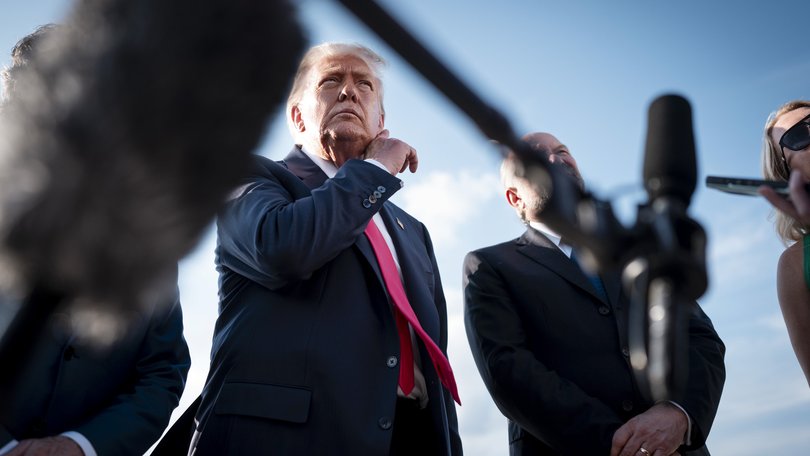THE NEW YORK TIMES: Trump pressures media giants as legacy newsrooms face lawsuits, defunding, and FCC reviews
THE NEW YORK TIMES: It might sound like 2016 all over again, but Trump’s new offensive against the media is more calculated and aggressive.

In declaring war on The Wall Street Journal over its coverage of his years-long friendship with convicted sex offender Jeffrey Epstein, President Donald Trump tapped his supporters’ distrust of his favourite foe — the news media — in an effort to put down a mutiny within his base, as my colleague Erica Green explained.
It was a familiar move that might have been lifted straight from his playbook in the 2016 presidential campaign.
But this is a very different moment. If Trump’s complaints about the media feel like a throwback to his first term, his actions toward the industry have gone much further than that.
Sign up to The Nightly's newsletters.
Get the first look at the digital newspaper, curated daily stories and breaking headlines delivered to your inbox.
By continuing you agree to our Terms and Privacy Policy.Over the past six months, Trump has undertaken a muscular and precise attack on the media’s pressure points. He has sought to dismantle Voice of America, the federally funded news agency that provides coverage to countries with limited press freedom, and persuaded his allies in Congress to cut funding for public broadcasting after decades of similar efforts sputtered out.
The tactics go well beyond cutting government funding, with the administration seeking to find — and use — every lever it has, just as it has in its attacks on certain universities. It has flexed its power over seemingly parochial matters — such as when some reporters at legacy media organisations including The New York Times lost their desks at the Pentagon to friendly right-wing media outlets, or by removing the Journal from the press pool on a coming trip to Scotland — and over bigger ones, too.
When Trump took office, his handpicked chair of the Federal Communications Commission, Brendan Carr, quickly revived complaints about 2024 election coverage by ABC, CBS and NBC that had been dismissed by the outgoing chair, and he said the outcome of a “news distortion” complaint about CBS could affect his agency’s review of a merger proposed between Paramount, CBS’s parent company, and Skydance. Those moves, my colleague Jim Rutenberg observed this year, recall Richard Nixon’s crackdown on the press after he won reelection — and they may succeed where Nixon failed, just as Trump failed in his first term.
“He is using the levers of government much more effectively as he has in other ways during this administration,” said Andrew Jay Schwartzman, a lawyer who specialises in media regulations and is the senior counsellor for the Benton Institute for Broadband & Society. “He has learned that he can enlist the Justice Department and an extremely compliant FCC chair to increase the leverage. And that is a big change.”
The other change, of course, is the way media companies have reacted as they reckon with a punishing environment. ABC settled a defamation case brought by Trump before he even took office, surprising legal observers who believed it would have been difficult for the president to prove his case in court. Jeff Bezos, owner of The Washington Post, instructed the paper’s opinion operation to narrow its purview, contributing to an exodus of writers there.
And Paramount, of course, agreed to pay $16 million to settle a lawsuit Trump brought over a “60 Minutes” interview on CBS — and then the network decided to take one of its most prominent Trump critics, Stephen Colbert, off the air.
CBS has blamed the bad economics of late-night TV for its cancellation of “The Late Show,” but there has been broad speculation, including from Democratic lawmakers, that politics played a part.
“Many people feared that once Trump started getting these unwarranted settlements — ABC, that kind of thing — these things build on each other,” Schwartzman told me. “I think it has made him feel empowered.”
Trump was not able to pressure the Journal to spike its story about him and Epstein with his threats of a lawsuit. And he may not be able to goad the news organisation, which is run by his billionaire frenemy Rupert Murdoch, into a premature settlement. Given his apparent success at pressuring others in the industry, Trump may be frustrated more than ever by coverage in news outlets that retain their independence.
This article originally appeared in The New York Times.
© 2025 The New York Times Company
Originally published on The New York Times
